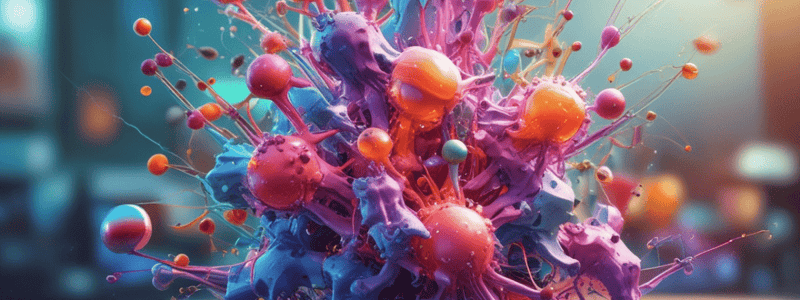Podcast
Questions and Answers
What are the three main requirements for a chemical reaction to take place according to Collision Theory?
What are the three main requirements for a chemical reaction to take place according to Collision Theory?
Collision, Orientation, Energy
What key concept in Chemical Kinetics relates reaction rate to activation energy?
What key concept in Chemical Kinetics relates reaction rate to activation energy?
Arrhenius equation
What does the Arrhenius equation help predict in chemical reactions?
What does the Arrhenius equation help predict in chemical reactions?
Reaction outcomes
What is the main focus of Chemical Kinetics?
What is the main focus of Chemical Kinetics?
In Electrochemistry, what is explored in relation to chemical properties?
In Electrochemistry, what is explored in relation to chemical properties?
What is the purpose of understanding Faraday's Laws of electrolysis?
What is the purpose of understanding Faraday's Laws of electrolysis?
What is the significance of the relationship between physical parameters and chemical properties in Physical Chemistry?
What is the significance of the relationship between physical parameters and chemical properties in Physical Chemistry?
Explain the importance of understanding reaction speeds in Chemical Kinetics.
Explain the importance of understanding reaction speeds in Chemical Kinetics.
How does Collision Theory explain the occurrence of a chemical reaction?
How does Collision Theory explain the occurrence of a chemical reaction?
What is the main focus of physical chemistry?
What is the main focus of physical chemistry?
What does electrochemistry study?
What does electrochemistry study?
What did Michael Faraday discover in the field of electric chemistry?
What did Michael Faraday discover in the field of electric chemistry?
Explain the First Faraday's Law.
Explain the First Faraday's Law.
What is the significance of the Second Faraday's Law?
What is the significance of the Second Faraday's Law?
Give an example of a phenomenon that can be understood through electrochemistry.
Give an example of a phenomenon that can be understood through electrochemistry.
Name one application of electrochemistry.
Name one application of electrochemistry.
What are some aspects included in physical chemistry?
What are some aspects included in physical chemistry?
How would you define organic chemistry?
How would you define organic chemistry?
Flashcards are hidden until you start studying
Study Notes
Physical Chemistry
In the realm of science, chemistry is often divided into two main branches: organic chemistry, which deals with carbon compounds, and physical chemistry, which focuses on understanding the behavior of matter under different conditions through mathematical principles. This branch encompasses various aspects including thermodynamics, gas laws, chemical kinetics, colligative properties, and electrochemistry among others.
Electrochemistry
Electrochemistry deals with the study of chemical reactions involving redox processes and energy conversion, where a change in the oxidation state of an element occurs within a substance or between substances. This field is crucial for understanding various phenomena like corrosion, batteries, fuel cells, electroplating, and electrolysis.
Faraday's Laws of Electrolysis
The laws were discovered by Michael Faraday in the early days of electric chemistry. They provide relationships linking the amount of charge passed during electrolysis and the mass of reactants involved. There are two main laws:
First Faraday's Law: For any given ion, the quantity of electricity required to deposit 1 mole of that ion is constant, dependent on the current density, but independent of the volume of solution and temperature.
Second Faraday's Law: For all electrolysis reactions, the same amount of charge should be present in the total discharge from the cell. This means that the ratio between elements in the initial solution remains constant even when the reaction proceeds.
Chemical Kinetics
Chemical kinetics studies rates of chemical processes (reactions) and the factors affecting them. It uses the rate laws, integrated rate equations, equilibrium constants, and mechanisms to predict reaction outcomes. Key concepts include the Arrhenius equation, which relates reaction rate to an activation energy, and collision theory, where reactants need to collide for a reaction to occur.
Collision Theory
According to this theory, for a reaction to occur, molecules need to collide with a certain minimum kinetic energy. Three main requirements exist for a reaction to take place:
- Collision: Reactants must physically strike each other.
- Orientation: Reactants must align correctly, i.e., collide 'head-on'.
- Energy: The collisions must provide enough energy to break bonds and allow formation of products.
Conclusion
Physical chemistry explores the relationship between physical parameters and chemical properties. By understanding the principles underlying topics such as electrical conductance in electrochemistry, reaction speeds in chemical kinetics, and changes in boiling points in colligative properties, we can gain valuable insights into substances' behavior and interactions. These fundamental concepts enable us to develop technologies like batteries and fuel cells, control industrial processes, and understand nature's intricate biochemical pathways.
Studying That Suits You
Use AI to generate personalized quizzes and flashcards to suit your learning preferences.




